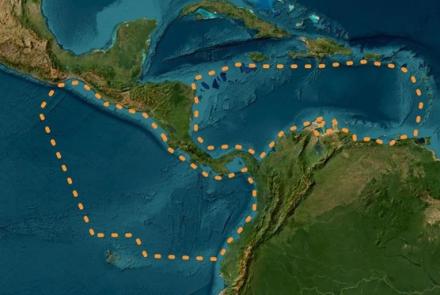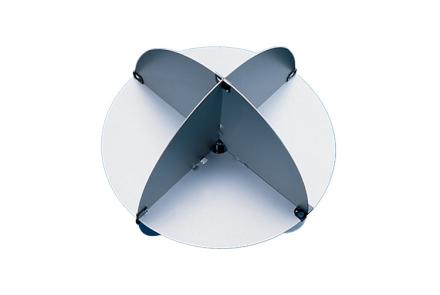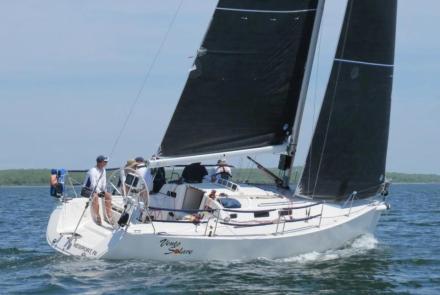Passage East (excerpt) by Carleton Mitchell
Excerpts from Passage East (the skipper/author’s log of the 1952 transatlantic race aboard his yawl, Caribbee)
By Carleton Mitchell
Racing a small yacht across the North Atlantic is not entirely a technical feat nor even an adventure in the classic sense; but it is a great emotional and physical experience for those involved – moments of exhaustion and exultation, of cold fog and blazing sunshine, of hard driving and maddening drifting. And always watch after watch the routine of living and shipkeeping goes on, day and night, with never a sense of monotony…
But waiting beyond the last buoy are the timeless elements of what I think of as the Sailor’s Three-Deck World: the surface of the sea, the atmosphere above, and the hidden depth below. Together they have influenced every voyage since man first ventured onto wide waters. A Bahamian fisherman squinting at the sky as norther clouds gathered once observed, “You eats what the cook serves”…moments of fatigue, discomfort, frustration, and apprehension, intermingled with elation, laughter, and just plain joy in the way of a boat with wind and wave. Such memories are timeless…
There is no sensation in the world to equal driving to windward in the open sea with just the right amount of breeze. Too much wind builds too big a sea and the boat labors and plunges and is stopped; too little breeze lacks the feeling of power and the exhilaration of speed…This is it; this is what we came for. It all won’t be as good as this. But as Sherman Hoyt once said after a miserable session off Cape Fear; “You’ve got to take the bad nights to get the good days.”…This is life at sea – reality, tangible problems to meet as they arise. All my doubts about hazards and expense and the rest are gone now we are underway, and they won’t return…
We are still close-hauled with conditions little changed from yesterday, except it is sunny.
We are still close-hauled with conditions little changed from yesterday, except it is sunny. At dawn we swept the ocean with binoculars but could not see any sails. So we are alone. The others are somewhere over the curve of the horizon, each little ship an entity unto itself. It is somehow a wonderful thing to imagine: five white sails against the blue vastness of the Atlantic, five crews completely cut off from all other men on this planet, accepting a certain amount of risk and hardship simply for the love of an intangible. There is nothing comparable except possibly the compulsion that drives men to climb remote mountains…
In the after stateroom I found the saddest spectacle in this round of the eternal battle of men against the sea. Dick Bertram, still nine-tenths asleep, was trying to get into his pants. He began on the windward settee, feet braced again the bureau aft and the bulkhead forward, but each time he arched his back and lifted his fanny to slide the pants under, Caribbee would dive and he would have to grab the edge of the bunk to keep from being catapulted to leeward. Finally he surrendered and slid across to the other settee…Such minor tribulations are hard to convey to a landsman, and especially the cumulative effect of them. Everything becomes an effort: dressing and undressing, preparing and eating meals, getting into or out of a bunk, even brushing the teeth or going to the toilet. As the weather worsens during a gale and the seas get bigger and more irregular, every job for self or ship becomes progressively more difficult and tiring…Thus the old saying that “the ship will take more than the crew.” Long before a boat is overpowered the men aboard can become too fatigued to handle her. It is something a skipper must always remember…
There was never a more beautiful night. We came on deck at 11:00 to find brilliant moonlight, the horizon so clearly defined it looked like the glow of coming dawn. The few puffy clouds drifting overhead seemed to be lighted from within and the path of moonlight across the water was almost blinding. Is there anything more fascinating to watch than the play of moonlight at sea? Anything more infinitely varied than the patterns of light and shadow? And especially when the track lies directly astern, so it lights the wake, emphasizing in tumbling disturbed water the sensation of speed. We roll, we boil…
. I was just a-settin’ and a-dozin’ and not a-botherin’ nobody when the old go-fast bug came a-sashayin’ up and bit me hard.
I don’t know when in my sailing career it happened to me, this craving for speed. I was just a-settin’ and a-dozin’ and not a-botherin’ nobody when the old go-fast bug came a-sashayin’ up and bit me hard. And it took. From a lazy character who would just as soon loll in the cockpit watching Portuguese men-of-war sail through his lee I became the wild-eyed type who laughs demonically as the lee rail disappears and looks around for something else to set. So long as the boat is moving I’m happy; when she slows, I die. A terrible thing to confess. Yet now I pity the cruising man I used to be: you get more real sailing – more the real feel of wind, and sea, and a boat – in a week of racing than in a year of cruising…
Bulkheads creak and groan, and the sound of water rushing past the hull at my ear has a new note. Parachute spinnakers are efficient brutes, but the strains they set up are incredible. Often I wonder how wood and metal can be engineered to withstand the strains imposed. Despite my prayers for strong fair winds here endeth the period of relaxed calm. Beating to windward at sea can be wet and uncomfortable, but things are always under control; forces can be accurately judged and strains evaluated. But running off before it is something else, the most difficult and delicate test of seamanship. But seamanship, as Uffa Fox once pointed out, is only another name for common sense – the latter commodity not entirely compatible with ocean racing…
The cold misting rain has not let up…A swell has set in from the north; it is colliding with the remains of the southwesterly swell of yesterday and causing something of a bobble. Hurts us in this light windward going. It is hard to keep up racing tension. Came on deck earlier to find a cockpit bull session, all hands laughing and talking, the helmsman casually joining in. So for once I turned heavy skipper and “broke it up” Navy style. Now feel embarrassed although I know everyone in their hearts agreed with me…Caribbee has been sailed as conscientiously as any boat I have ever been aboard even for a short race…But this transition has made our spirits sag, and consequently lowered our racing efficiency…we would never forgive ourselves if we lost by minutes and could think back and remember where we ourselves had thrown away hours…
Wind Waves at Sea points out that a seaman “may never, in a lifetime, encounter waves of the great heights…even if his voyages regularly cross and recross the stormier parts of the oceans in stormy seasons.” Yet always behind the calm there is the threat, the latent power, the implacable and impersonal force. On Caribbee, sailing out into the stormier latitudes of one of the stormiest of oceans, we had to be prepared for whatever the gods might have in store – as have all sailors since the first ship ventured forth on wide waters…
[W]hile fishing vessels larger and far more heavily constructed than Caribbee would theoretically shorten sail, we carry everything that can be hung from the masts…Which makes me consider the somewhat fantastic nature of ocean racing. Here we are, nine men, driving a fragile complex of wood, metal, and cloth through driving rain and building sea, a thousand miles from the nearest harbor; no one to see or admire or applaud; no one to help if our temerity ends in disaster. We exceed the bounds of discretion, even go beyond what we know is good seamanship – those basic lessons passed down through generations of men who have fought the oceans. In us all there is a devotion to the somewhat formless and unspoken ideal of simply keeping the boat going at her maximum speed, a dedication which carries us beyond considerations of personal comfort and even safety…
The ritual of morning stars is one of the most beautiful moments of the day: the navigator standing ready, at first a barely discernible silhouette as he identifies his prey by altitude and azimuth. Then an almost imperceptible glow begins to dissolve the weld of sea and sky, and gradually the line of the horizon becomes distinct. The day grows lighter, and the dimmer stars fade. The sky goes from black to gray, and slowly assumes delicate shadings of yellow and pink. Patches of foam from breaking crests appear gray against the darker gray of the sea, as though the water loathe to give up the stored blackness of the night. “Stand by!” suddenly calls the navigator. “Stand by!” you repeat, mumbling seconds as the hand of the watch scurries around the dial…”Mark!” There is urgency in the command, the sense of communication of a precise instant in the eternity of time...You record hour, minute, second, and the altitude, and the musical names assigned the stars by the ancients: Vega, Kochab, Altair, Capella, Jupiter, Dubhe, Aldebaran…Somehow it is a wonderful way to begin a day, a combining of old mysteries and modern precision. And you always feel grateful that again you are fixed on the earth’s surface in relation to all other objects: to the islands, to the continent, to the reefs. Somehow you feel less alone…
It is strange but I feel in the last few days we all have a different attitude about this race. At first there was constant speculation about the other boats, their qualities and potentials, and how they would be sailed. In a sense, for the first few days, we were sailing hard because we were racing the others, a purely competitive sensation. But now I believe our concentration is solely on Caribbee. It has become a fetish to keep her moving as fast as possible; it has also become our greatest pleasure. She seems to us so wonderful, this supposedly inanimate object, we can do nothing else. She has carried us almost across an ocean, kept us safe and comfortable, responded to our every demand, forgiven our excesses. In return, we have learned her whims and desires, and are will slaves to both…
No aspect of the sailor’s world is more mysterious to the landsman than the practice of navigation. To find a precise point in the trackless waste seems neither art nor science, but magic. Yet in no other sphere of progress has the continuity of development been so clearly based on the heritage of the past, nor has the accumulated knowledge been so universally shared by men of all races, creeds and nations. The word navigation stems from the marriage of a Latin noun and verb: navis, a ship, and agere, to move or direct. Its progress has been essential to the development of every maritime civilization. In Europe, the first glimmerings of scientific navigation began with the introduction of the compass, although men had already made long voyages without its aid. There is considerable evidence that an expedition of Phoenicians circumnavigated Africa 600 years before the birth of Christ. There is also evidence the Greek Pythias of Marseilles reached Iceland and beyond 200 years later. Meanwhile the Polynesians found their way from island to island in the vast reaches of the Pacific by crude but accurate diagrams of the stars, and Norsemen regularly traded across the breadth of the North Atlantic by computing latitude from the length of the sun shadow cast along an oarsman’s thwart by the gunwale of the ship…[T]he simplest implements of voyaging are compass, lead, and log. With these men still find their way for long distances in many parts of the world, practicing a type of navigation more art than science, “dead reckoning.” “Dead” is a contraction and corruption of “deduced,” where the ship’s position is a matter of deduction after consideration of all possible variables – compass error, current, leeway, and even human fallibilities of the helmsmen…Landsmen probably do not realize that for smaller vessels there has been no basic advance in navigation since that first voyage of Cook, with the possible exception of radio reception as a check on the timekeeper, and establishment of lines of position. Loran, radar, automatic position-computers, and all the other gadgets are for large steamers and ships of war, not anachronistic little vessels of wood and canvas. Instruments have been improved, tables have been made more complete and simpler to use, yet the tools and techniques are essentially those of two centuries ago. And let fog or storm hide the sun and stars, and even sextant and chronometer become useless, forcing the sailor still farther back down the ladder of centuries. Navigation is then no longer a science, but an art, and a prayerful one at that. Thus still, for the small-boat sailor, a landfall at the end of a long passage has a quality of suspense, of thanksgiving, and will continue to so long a little ships sail the seas…
For once a clearing sky did not kill the breeze. We go beautifully. Everything sparkles – the water, the sky, even the air. As I sit in the lee side of the cockpit and look ahead I am reminded of a similar day and circumstance; the recollection is so vivid if I could not place it exactly it would worry me until I did. For in ’49 we had precisely similar conditions when Caribbee left Kalmar, Sweden, for the tiny Danish island of Chistiansö. We came out into the Baltic from behind Öland Island carrying this same balloon jib, sheeted the same way, and the glint of sun across the water was the same, the curl of the bow wave and the toss of white foam off to leeward was the same, and so was the look of the sky and the feel of the air and the heft of the breeze. And we reached down the sunlit Baltic then as we are now reaching across the approaches to the English Channel, with the same feeling of unreality that goes with making dreams come true. Life can offer no more…
It suddenly occurs what a wonderful way this is to end an open-water passage, driving along for a landfall on a clear night at 8 knots, decks dry except for spray forward, sails patterned against the stars, a wide path of foam under the counter. No other sensation could match it. This is why we can never stop, we who once know the lure of the sea.





